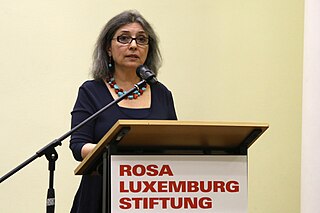Related Research Articles

Patricia Hill Collins is an American academic specializing in race, class, and gender. She is a distinguished university professor of sociology emerita at the University of Maryland, College Park. She is also the former head of the Department of African-American Studies at the University of Cincinnati. Collins was elected president of the American Sociological Association (ASA), and served in 2009 as the 100th president of the association – the first African-American woman to hold this position.
Black feminism is a branch of feminism that focuses on the African-American woman's experiences and recognizes the intersectionality of racism and sexism. Black feminism philosophy centers on the idea that "Black women are inherently valuable, that [Black women's] liberation is a necessity not as an adjunct to somebody else's but because of our need as human persons for autonomy."

Shahrzad Mojab is an academic activist and professor, teaching at the Department of Leadership, Higher and Adult Education and Women and Gender Studies Institute, at the University of Toronto. Shahrzad has been living in Canada since 1986 with her lifelong partner, colleague and comrade, Amir Hassanpour, and their son, Salah.

Sarojini Sahoo is an Indian feminist writer, a columnist in The New Indian Express and an associate editor of Chennai-based English magazine Indian AGE. She has been enlisted among 25 Exceptional Women of India by Kindle Magazine of Kolkata. and is an Odisha Sahitya Academy Award winner.

France Winddance Twine is a Black and Native American sociologist, ethnographer, visual artist, and documentary filmmaker. Twine has conducted field research in Brazil, the UK, and the United States on race, racism, and anti-racism. She has published 11 books and more than 100 articles, review essays, and books on these topics.

Feminist literature is fiction, nonfiction, drama, or poetry, which supports the feminist goals of defining, establishing, and defending equal civil, political, economic, and social rights for women. It often identifies women's roles as unequal to those of men – particularly as regarding status, privilege, and power – and generally portrays the consequences to women, men, families, communities, and societies as undesirable.
Jin Tianhe was a scholar, poet, politician, and writer from the Anhui Province. Jin Tianhe is most well-known for publishing the first Chinese feminist manifesto, The Women's Bell. Other popular works include Jiangsu, The Weekly Independent, A Flower In A Sinful Sea, and The Grand Magazine. Jin Tianhe was born into nobility during the Qing era and received an elite education, but was greatly critical of the government and supported the overthrow of the Qing. Themes of Jin Tianhe's work include racial envy, gender equality, women's rights, and national salvation. Through his work, Jin Tianhe expressed his desire for gender equality and criticized the backwardness of China's social relations and government, while praising the West for their non-oppressive ideologies. Although his work was influential, it was often debated by other scholars and critiqued for being overly progressive and ignorant of contemporary realities. Currently, his contributions to the feminist movement is still expressed by a large number of actors through media, books, and speeches.
Angana P. Chatterji is an Indian anthropologist, activist, and feminist historian, whose research is closely related to her advocacy work and focuses mainly on India. She co-founded the International People's Tribunal on Human Rights and Justice in Kashmir and was a co-convener from April 2008 to December 2012.
Feminism in Mexico is the philosophy and activity aimed at creating, defining, and protecting political, economic, cultural, and social equality in women's rights and opportunities for Mexican women. Rooted in liberal thought, the term feminism came into use in late nineteenth-century Mexico and in common parlance among elites in the early twentieth century. The history of feminism in Mexico can be divided chronologically into a number of periods with issues. For the conquest and colonial eras, some figures have been re-evaluated in the modern era and can be considered part of the history of feminism in Mexico. At the time of independence in the early nineteenth century, there were demands that women be defined as citizens. The late nineteenth century saw the explicit development of feminism as an ideology. Liberalism advocated secular education for both girls and boys as part of a modernizing project, and women entered the workforce as teachers. Those women were at the forefront of feminism, forming groups that critiqued existing treatment of women in the realms of legal status, access to education, and economic and political power. More scholarly attention is focused on the Revolutionary period (1915–1925), although women's citizenship and legal equality were not explicitly issues for which the revolution was fought. The Second Wave and the post-1990 period have also received considerable scholarly attention. Feminism has advocated for the equality of men and women, but middle-class women took the lead in the formation of feminist groups, the founding of journals to disseminate feminist thought, and other forms of activism. Working-class women in the modern era could advocate within their unions or political parties. The participants in the Mexico 68 clashes who went on to form that generation's feminist movement were predominantly students and educators. The advisers who established themselves within the unions after the 1985 earthquakes were educated women who understood the legal and political aspects of organized labor. What they realized was that to form a sustained movement and attract working-class women to what was a largely middle-class movement, they needed to utilize workers' expertise and knowledge of their jobs to meld a practical, working system. In the 1990s, women's rights in indigenous communities became an issue, particularly in the Zapatista uprising in Chiapas. Reproductive rights remain an ongoing issue, particularly since 1991, when the Catholic Church in Mexico was no longer constitutionally restricted from being involved in politics.
Women's Action Forum (WAF) is a women's rights organization in Pakistan.

Chandra Talpade Mohanty is a Distinguished Professor of Women's and Gender Studies, Sociology, and the Cultural Foundations of Education and Dean's Professor of the Humanities at Syracuse University. Mohanty, a postcolonial and transnational feminist theorist, has argued for the inclusion of a transnational approach in exploring women’s experiences across the world. She is author of Feminism Without Borders: Decolonizing Theory, Practicing Solidarity, and co-editor of Third World Women and the Politics of Feminism, Feminist Genealogies, Colonial Legacies, Democratic Futures, Feminism and War: Confronting U.S. Imperialism,, The Sage Handbook on Identities, and Feminist Freedom Warriors: Genealogies, Justice, Politics, and Hope.
Feminism in Bangladesh seeks equal rights of women in Bangladesh through social and political change. Article 28 of Bangladesh constitution states that "Women shall have equal rights with men in all spheres of the State and of public life".
Multiracial feminist theory is promoted by women of color (WOC), including Black, Latina, Asian, Native American, and anti-racist white women. In 1996, Maxine Baca Zinn and Bonnie Thornton Dill wrote “Theorizing Difference from Multiracial Feminism," a piece emphasizing intersectionality and the application of intersectional analysis within feminist discourse.
Radhika Chandiramani is the founder of TARSHI, a New Delhi–based NGO that works on issues of sexual and reproductive health and rights. She is a clinical psychologist, writer and editor. Her published works on sexuality and human rights have been covered in media and scholarly reviews. Chandiramani received the MacArthur Fellowship in the year 1995 for leadership development. She is also the recipient of the 2003 Soros Reproductive Health and Rights Fellowship from Columbia University Mailman School of Public Health.
Ambreen Salahuddin is a Pakistani poet and author. Ambreen Salahuddin is the author of seven books. Her first book of Urdu poetry was published in 2004 titled as "Sar-e-Dasht-e-GumaaN" and second book of Urdu poetry was published in 2014, titled as "Sadyon Jaise Pal". The second edition of "Sadyon Jaise Pal" is published by Sang-e-Meel publications in 2019. Her other books include a research work "Feminism in modern Urdu poetesses" (2005), a companion of Gender Studies in Urdu "Farhang-e-Sinfi Mutaleyat" (2018) and translation of Richard Dawkins's The Magic of Reality, "Haqeeqat ka Jadu" (2018). Dr Ambreen Salahuddin translated Mansha Yaad's celebrated novel 'RaaheiN' into English with the title "Crossroads" (2022), which is published by Pakistan Academy of letters. She has also translated Yu Hua's novel 'Chronicle of a blood merchant' into Urdu titled as "Khoon bechne wale ki sarguzasht", published by Sang e Meel Publications (2022).
Feminism in Pakistan refers to the set of movements which aim to define, establish, and defend the rights of women in Pakistan.This may involve the pursuit of equal political, economic, and social rights, alongside equal opportunity. These movements have historically been shaped in response to national and global reconfiguration of power, including colonialism, nationalism, Islamization, dictatorship, democracy, and the War on Terror. The relationship between the women's movement and the Pakistani state has undergone significant shifts from mutual accommodation to confrontation and conflict.
Alanoud Alsharekh is a Kuwaiti women's rights activist who is a founding member of Abolish 153, a campaign calling to end honour killings in Kuwait. She has been awarded the Ordre national du Mérite and was made one of the BBC 100 Women in 2019.

The term Chicanafuturism was originated by scholar Catherine S. Ramírez which she introduced in Aztlán: A Journal of Chicano Studies in 2004. The term is a portmanteau of 'chicana' and 'futurism', inspired by the developing movement of Afrofuturism. The word 'chicana' refers to a woman or girl of Mexican origin or descent. However, 'Chicana' itself serves as a chosen identity for many female Mexican Americans in the United States, to express self-determination and solidarity in a shared cultural, ethnic, and communal identity while openly rejecting assimilation. Ramírez created the concept of Chicanafuturism as a response to white androcentrism that she felt permeated science-fiction and American society. Chicanafuturism can be understood as part of a larger genre of Latino futurisms.
Shirkat Gah women's resource centre, is a women's rights organization in Pakistan which focuses on research, publications and advocacy on women's issues.
References
- ↑ "Pakistani scholar Dr Rubina Saigol passes away". The Express Tribune. 27 August 2021. Retrieved 27 August 2021.
- ↑ "Dr. Rubina Saigol". Insan Foundation Trust Database. Retrieved 11 October 2019.
- ↑ Rubina, Saigol (June 2005). The Pakistan Project: A Feminist Perspective on Nation & Identity. ISBN 8188965219.
- ↑ Rubina, Saigol. Feminism and the Women's Movement in Pakistan Actors, Debates and Strategies (PDF). Friedrich-Ebert-Stiftung (FES). Retrieved 11 October 2019.
- ↑ Robina, Saigol (1995). Knowledge and identity: articulation of gender in educational discourse in Pakistan. The University of Michigan: ASR Publications. ISBN 9789698217303.
- ↑ Tamsin, Bradley; Robina, Saigol (2012). "Religious values and beliefs and education for women in Pakistan ()". Development in Practice. 22 (5–6): 675–688. doi:10.1080/09614524.2012.685863. S2CID 144483889.
- ↑ Rubina, Saigol (2006). The State and the Limits of CounterTerrorism: The Case of Pakistan and Sri Lanka (PDF). Council of Social Sciences, Pakistan. ISBN 969-8755-08-X.
- ↑ "CURRICULUM OF WOMEN'S STUDIES BS & MS" (PDF). Higher Education Commission, Pakistan. Archived from the original (PDF) on 12 July 2019. Retrieved 11 October 2019.
- ↑ "BAYAN – ADVISORY BOARD". Simrogh - Women Resource & Publication Centre. Archived from the original on 21 March 2018. Retrieved 11 October 2019.
- ↑ https://herald.dawn.com/authors/101/rubina-saigol
- ↑ http://tns.thenews.com.pk/writers/rubina-saigol/
- ↑ "BAYAN – Advisory Board – SIMORGH". Archived from the original on 21 March 2018. Retrieved 11 October 2019.
- ↑ "The woman who exposed the rot in Pakistan's education system - Times of India". The Times of India. ISSN 0971-8257 . Retrieved 21 July 2023.